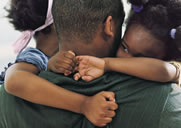 |
Problems hair pulling can cause:
Psychological Problems
- Many people with trich report feeling depressed or unattractive due to hair pulling. This is a very confusing scenario because hair pulling is self-inflicted. In other words, people become frustrated because they don't like the way trich impacts their lives, yet they keep pulling.
- Oftentimes, people with trich express feelings of shame, irritability, and low self-esteem secondary to their pulling. These bad feelings can become so pervasive in a person's life that it causes the person to believe that their trich IS who they are…that their behavior defines who they are as a human being.
- Most people with trich keep their hair pulling secret from their loved ones, supporting the notion that people with trich live in hiding or in silence about their symptoms. The hidden nature of the disorder leads to more shame and fear of discovery, interfering with sufferers' ability to accept themselves and their behavior.
Social Problems
- People with hair loss due to pulling tend to avoid certain activities such as professional hair cuts, swimming, sports, intimate sexual encounters, and windy or well-lit places. Avoidance of these activities can lead to isolation or withdrawal from social interaction, leading to feelings of loneliness and rejection.
- In addition to avoiding relationships and places, many people with trich wear wigs, hair extensions, make up, false eyelashes, scarves, hats, long sleeves or other hair "appliances" to cover the loss. Those with less obvious hair loss are able to cover it by styling the hair in a certain fashion or wearing make-up to cover bald areas.
- Hair pulling can become a source of relationship turmoil, such as nagging from a spouse or parent, degrading remarks or put downs from friends or loved ones which can feel like punishment for the behavior, being accused of not trying hard enough to stop, and rude or insensitive remarks from strangers or acquaintances.
Medical Problems
- Repeated pulling of the hair can lead to damage to the hair follicle, which can affect hair re-growth.
- Damaged follicles will produce gray or white hair, and often hair that is more coarse or kinky, which can lead to more pulling (Keuthen, Stein & Christenson, 2001).
- Skin damage from pulling, picking, scratching or the use of tweezers can lead to serious infections requiring medical attention.
- Hair biting has been reported to cause gum disease and enamel erosion on the teeth.
- Hair ingestion can lead to the development of gastric and/or intestinal trichobezoars (hair balls) which can be life threatening and, when large, must be surgically removed.
- Repetitive hair pulling can lead to muscle fatigue and can result in carpal tunnel syndrome (O'Sullivan et al., 1996).
- Avoidance of regular doctor visits out of fear of embarrassment or discovery can increase the chances that various medical problems will go undetected.
|
 |
|

| About
Trichotillomania
|
People with hair loss due to pulling tend to avoid certain activities such as professional hair cuts, swimming, sports, intimate sexual encounters, and windy or well-lit places.
|
| Our Commitment To Privacy |
The creators of
StopPulling.com
are dedicated to protecting your privacy and assuring confidentiality to
subscribers.
|
|